Sara Davidson
|July, 21, 2018
We had little to go on when my sister, Terry, and I took off for Hungary, to reverse the journey our grandparents had made when they’d come to America in the early 1900s. We had some family stories, a couple sepia photos, and an application for U.S. citizenship filled out by our grandfather, Louis Wass.
What would we find? It had been more than 100 years since they’d lived there. Two world wars and borders that changed three times had probably destroyed every trace of them.
Yet it seems that many are feeling the urge we did—to visit the country of our ancestors. I wanted to see the forests, walk along the Danube, smell the air, and search the Jewish cemeteries for familiar names. I wanted to taste the foods I associate with my childhood: matzo ball soup, stuffed cabbage, chopped liver, apple strudel. And I wanted to hear the language my grandparents spoke together and with Hungarian friends, who had names like Farkass, Gac, and Boczn. I never expected that satisfaction would come from a sensory experience in an unforeseen spot.

Budapest
I had adored my Grandpa Louis, a big-hearted, playful, small yet strong man who made each of his grandchildren feel cherished. He often drove me home from school; when kindergarten let out, he’d be standing on the grass, arms wide open, and yell, “One, two, six!” — the signal for me to run to him, and he’d swing me in the air.
Grandma Rae was more timid, nervous, and shy. We were astonished to learn that at sixteen, she’d begged her parents, “Let me go to America. Please! I’ll send back money.”
I knew I had to visit Hungary, but the timing had never been right. Then fate intervened. Last winter, while at a ski camp in Deer Valley, UT, I met a woman, Susan Green, who’d grown up in the very town my grandfather had been from—Debrecen. Susan, a small, blonde dynamo of 59, spoke with an accent like that of my grandparents. She said she and her husband, David, were organizing a trip to Hungary for their friends in Utah, “to show them my home country.” She invited me and Terry and, wonder of wonders, the dates worked for us both.
The week before leaving, I dug up the only document I had, the application for citizenship filed in 1915 by Louis Wass. I scanned his info, stating he was 5’4”, 126 pounds, had blue eyes, brown hair… Then I stopped. For birthplace, he’d written, “Nyirmartonfalva, Hungary.”
He’d always said he was from Debrecen! I googled Nyirmartonfalva and, after a delay, it popped up: a village of about 2000, 13 miles east of Debrecen.
Susan arranged for an interpreter to take us to the village the day after we arrived. It was overcast and drizzling, with forest on either side of the road. The only vehicles we saw were trucks carrying cinnamon-colored logs in neat stacks.
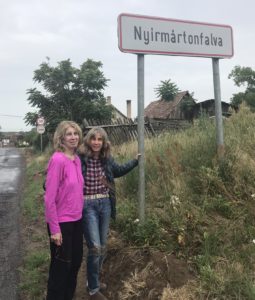
Reaching the village, we stopped the first woman we saw, riding a bicycle. Our guide, Nora Erdei, a lovely young woman who speaks near-perfect English, asked if any Jews lived in the town now. The bicyclist shook her head. “A long time ago, there were Jews,” she said. “One family, the Sterns, had a large farm, but they all left around 1943.” Why? I asked. She shrugged. “I don’t know. It was before I was born.” I was thinking, maybe they sensed danger and fled?
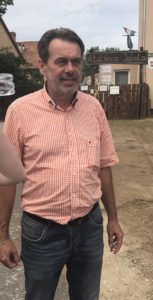
It was chastening to realize they were not much older than I; they’d been about ten when the Jews left.
The man said his house was built where a Jew had lived. “When we built it we found some of the old structure. It had a dirt floor.” He said the family who’d lived there had a kitchen garden and a shop next-door, one of three shops owned by Jews on the street. “The wives ran the stores while the men were traveling, trading for goods to sell,” he said.
“Was there tension with the Jews?” I asked the oldest resident.
“No,” he said.
“Why did they leave?”
He shrugged. “I don’t know.”
“Did any come back?”
“No.”
We walked to the school that had once been the cemetery, and found, beside it, a rude slide and swings on a scrubby field. Terry and I stood in the center of the field.
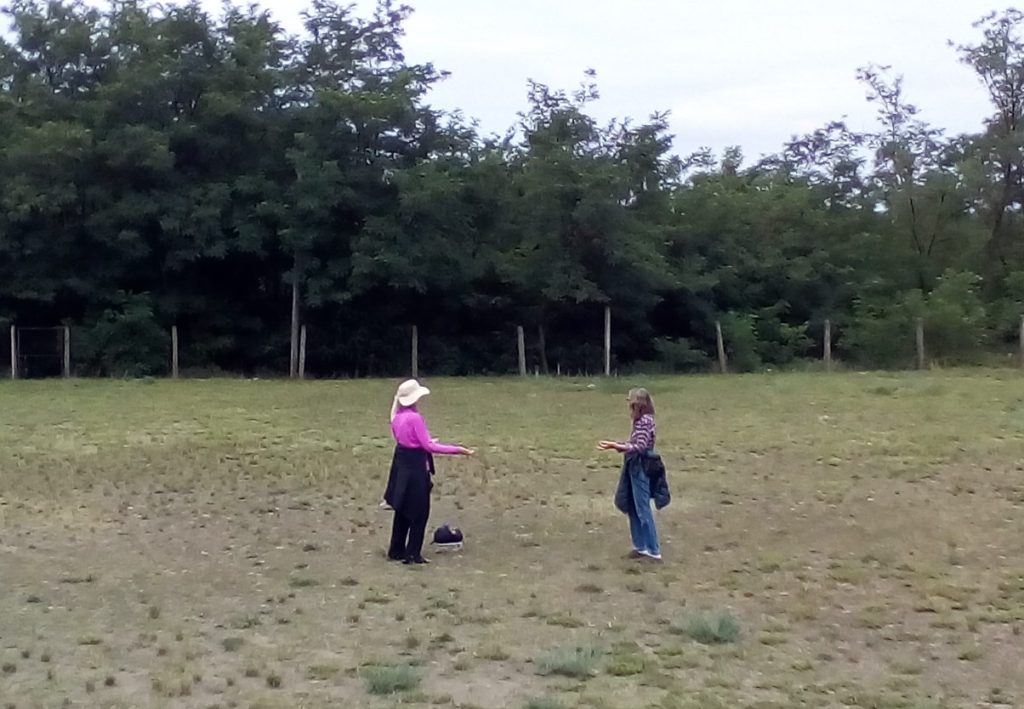
She teaches T’ai Chi Chih, and we did some of the movements, raising our arms in unison, sensing the energy and thinking of the souls—our tribe—whose bodies had moldered underneath.
Back at city hall, the mayor gave us a book they’d made about the village. We couldn’t read it, but it contained scores of photos from earlier times, when the homes were dug out of the earth. Later they were built of wood with thatched roofs, which periodically burned down and were rebuilt.
We knew our grandfather had been apprenticed to an upholsterer at about age 12. He must have gone to Debrecen then, for no furniture was made in the village. Our grandmother, living in a squalid part of Budapest, was sent out to work, cooking for other families, when she was 10. Both had six or seven siblings, some of them half siblings. It was common for men to have several wives, because the women worked hard, had numerous kids, and died young.
The book revealed what I’d longed to see: the kind of homes they’d lived in; the roads they’d walked, along with chickens and sheep; the clothes they’d worn. In the photos, the women had drab scarves tied over their heads, and the kids in school were barefoot. On the inside cover, a map showed “Jewish Hill” and the “Stern Farm.”
That night, we joined our group for an opulent dinner at our spa-hotel near Debrecen. Five of us were Jews and six were Mormons, but everyone wanted to hear about Nyirmartonfalva. When I said we’d been told the Jews “all left in 1943…” Susan interrupted: “That’s the wrong word. You think, every one of them decided to ‘leave’ at the same moment? They were deported.”
Jews in the countryside, I learned, were the first to be deported to Auschwitz. Hungary had refused to turn over the Jews in Budapest, but in 1944, Germany took over the country and did the job. Because it was late in the war, more survived than from other countries and today, Budapest has the second largest Jewish community in Europe. (after Paris)
The rest of the tour, for me, passed in a blur of dramatic architecture, river and plains, statues and castles, Jewish suffering and renewal. I was enchanted by a drive through the Hortobagy, a vast grassland that’s a UNESCO world heritage site, where people raise unique breeds of sheep and pitch black horses.
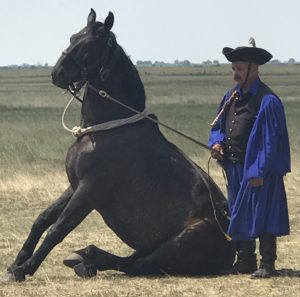
I was gaining a sense of how locked-in the country is, surrounded by Austria, Croatia, Romania, Czechoslovakia and Russia, none of them traditionally welcome to Jews. As the holocaust intensified, where could they escape?
Budapest is a more fabulous city than photos can suggest. The architecture makes the jaw drop—a mixture of Gothic, Ottoman, Baroque, Italian Renaissance, and Art Nouveau. Our guide told us, “Hungary has been on the wrong side of every war. The losing side.” So it’s been occupied by many other countries.
We visited the Jewish Community Center, whose mission is to resurrect the community, gathering up people who’ve been hiding their identity for decades. Zsuzsa Fritz, the director, who’s 54, with curly red hair, said, “I grew up with three generations living together, and I didn’t know I was Jewish until I was 16. There was nothing in our home to indicate we were Jews.” When her father passed away, she said, “I noticed all the people coming to the funeral were Jews. They’d been silenced by the Nazis and then by the Communists.”
Michael Paley, a rabbi from Boston who now lives in Budapest, said, “The trauma of the holocaust is still alive.” There are visceral reminders: a wall of the ghetto that still stands; a line of bronze shoes along a stretch of the Danube, where Jews were ordered to remove them, then were shot and pushed into the frozen river.
Rabbi Paley said that new generations are growing up “without that fear.” While the government of Victor Orban makes anti-Semitic statements, he said, “It’s mostly rhetoric. I’m never afraid to wear a yarmulke in Budapest. In Paris, I’m afraid.”
A major theme of our tour was food, food, food. Susan Green had planned it to be a five-star experience, so there were three course lunches and dinners that lasted three or four hours—every day. It began to remind me of the French film, La Grande Bouffe, where friends decide to gorge themselves to death on fine cuisine. Each of our dinners began with an hors d’oeuvre plate that included whole goose liver with fat and onions (no chicken liver anywhere), and sometimes duck necks and cracklings, described as “fried fat.”
The apotheosis was dinner at the New York Café, which claims, justifiably, to be “the most beautiful café in the world.”
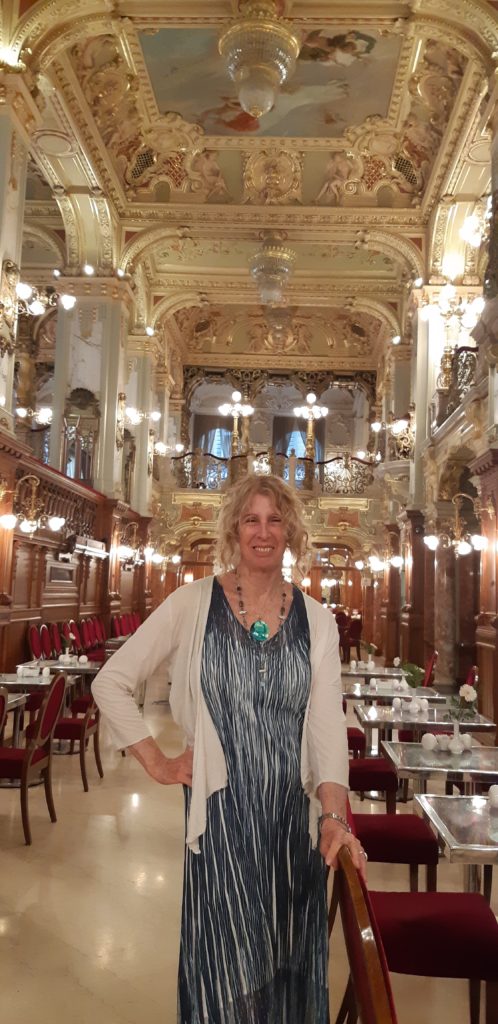
Opened in 1894, closed during the wars and resurrected, it was a gathering place for artists and writers. The rooms evoke New York City’s gilded age, with frescoes on the ceiling, Murano glass chandeliers, gold, marble, and wrought iron balcony railings in Art Nouveau designs. Our table was set with silk napkins and purse hangers at each lady’s place. For every course, a team of waiters each brought out two plates, forming lines behind us. At a signal, they all set the plates in front of us in one choreographed swoop.
Is it possible, we wondered, to have too much of a good thing?
For the soup course, green pea puree was poured from small silver pitchers into our bowls, which contained four peas and one tiny quail’s egg that had been deep-fried. My main course was listed as “Butternut squash pottage with dill ice cream.” But the plate contained nothing resembling ice cream. It had yellow foam, a green sauce, and two porous beige squares. “What are those?” I asked the server.
“Sponge.”
Sea sponge? I asked. It looked like something pulled from the sea.
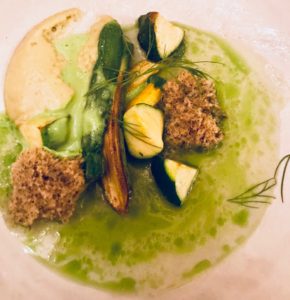
“It’s like a sponge cake,” he said.
Sponge without the cake.
The most delicious meal for me came in the village of Holloko, which I’d never heard of and reminded me of colonial Williamsburg. The homes had been restored to look like they did in the 18th century, with people clad in traditional costumes. One woman prepared and served us lunch, setting up a table that filled her entire front room, painted pink. She brought out bowls of chicken soup, with slender noodles and pieces of carrot. I took a spoonful and…Eureka!
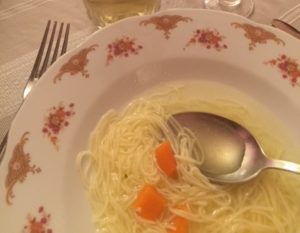
It tasted exactly like the soup my grandmother made, my mother made, and I learned to make. Simmered for hours, the clear golden liquid was infused strongly with the flavor and aroma of chicken. It was like Proust with the madeleine. I was back in my grandparents’ dining room for Rosh Hashana, with our whole family sitting in folding chairs around the table that filled the room. The sense memories continued: after soup there was chicken paprikash with tiny dumplings, and for desert, strudel made with fresh cherries.
Mike Peterson, a prosperous Mormon businessman, said it was the best meal he’d had in Hungary, and the house reminded him of his grandmother’s. Susan Green said it was “common Hungarian food.”
Yes! That’s what I’d longed for, come here to taste. That’s what our immigrant grandparents cooked, and what made us feel connected, as if by a golden thread, to past, present and future.
I felt awe, and said a silent thanks to our grandparents who, alone and in their teens, had the courage and resourcefulness to make it to America.
The trip was complete.
Sara this is so heartwarming. You described our trip to a T. Just lovely. I feel like I just went back there again for a moment in time. Thank you for your beautiful narrative.
Sara Very well written.
We are going on a river cruise in Oct. and November and we end in Budapest and then go to Prague for three days. I am so looking forward to it. Even more after reading this.
I liked this entry very much, Sara. Thanks. Food (aroma, taste, texture) provides a deep connection to the past. I have my grandmother’s and mother’s recipe file boxes and when I miss them I make one of their recipes…Best wishes to you. Abby
Thanks, Abby. I agree with you about food. You’re lucky to have those recipe boxes. A similar experience happened for me several years ago, when I used my grandfather’s pickle recipe, and they tasted just like his did. Joy! Here’s what I wrote then: http://www.saradavidson.com/blog/2007/09/pickles-from-grandpa-louie.html
Budapest! One of my favorite places. Did you make it to the Roman Bath? And don’t you love the tram–we just hopped on to see where it would go.
Thank you for the history / herstory. As always, a good read.
Lovely piece, Sarah. The chicken noodle soup is what I related to. When my brother and mother traveled (in 1999) to Slovenia to meet our relatives and stay in our ancestral home, they served the soup as a first course at every meal. My grandmother’s was exactly the same, and also a staple, but not at every meal. Slovenia and Hungary are related; some of our ancestral documents, possibly from my paternal grandfather, stated Hungary as his country of residence. So glad you and your sister were able to go together!
Thanks, Margaret. Yes, the borders between those countries were very fluid. My grandmother was born in Romania, which later became part of Hungary, then separated again. fascinating to trace, isn’t it?
Very tender, very sweet. Thaink for writing this Sarah!
Such a powerful and moving post about your journey, Sara!
Sara, It’s been a long while since I’ve seen your blog. I truly enjoyed reading the experiences you and your sister enjoyed, thank you. Made me want to get on a plane right away and travel there. Hope to hear more from you in the future.
A wonderful account , SAra
What a wonderful travelogue. I really enjoyed the myriad details about the villages, plus the gastronomic meals you encountered.
My ancestors came from Germany (also Jewish) before the first world war. I’d love someday to be able to trace their roots in person.
Thanks for the story, Roberta
What a wonderful trip you had. It makes me want to go there now. I didn’t know you were part Hungarian.
My father’s side, my non-Jewish side, of my family came from Hungary in about 1909. My great aunt was a fabulous cook, as was my father. We were raised on chicken and veal paprikas and polachinta (spelling iffy). The story goes that my great aunt was in love with a Jewish man but couldn’t marry him.
Have you read Elie Wiesel’s book, *Night*? That tells some of what the Hungarian Jews were experiencing.
The Hungarians in general were experiencing great hardships during the war and after (under Soviet rule). Another great aunt living in New York sent clothing to her family, and my father’s sister (my aunt) took over doing that when my great aunt died. When I was able to travel starting in the 1960’s, I asked my aunt about my visiting my Hungarian relatives. She advised against it because she said all they wanted was for us to send them clothing and money… I have visited my Jewish relatives in the US, England and Israel. A lot were lost during the Holocaust.
Love, Linda Pupos (pronounced in Hungary as Pu’posh–long o)
Dear Sara:
So happy to hear about your trip! Glad you all had such a great time, plus learned a lot about your family and their numerous hardships and unbelievable trials before coming to this country. I’m sure coming here and settling was also a huge undertaking. They were very brave people.
When you mentioned about your being told your family was from one place, but you found they were actually from another, it reminded me of my father’s and mother’s families, who left Portugal in the 1890s to go straight to Hawaii (Maui) to work and live on the plantations. My father’s family always said they were from The Azores/Funchal. I think what they used to do is if they were from a small village, they would often say they were from the nearest ‘big city’ to them. Maybe they felt no one would know of their small village, but they would have heard of the big city? Maybe the smaller villages were more like districts of the larger city, like Brooklyn or Soho is to New York City?
My parents and their parents and grandparents who were the original people who came from Portugal are, of course, all gone now. None of us speaks Portuguese, nor can any of this s afford to make the trip anyway, but like you experienced, I’m sure the places in Portugal have changed so much now and all the old people are gone, so it would be difficult to find anyone who may have known either my father’s or mother’s ancestors at this point. I’m afraid a trip isn’t in the cards for us, but I’m very glad you and your family/friends were able to go and search/learn about your own history.
People forget, in most cases, these were very young people, who could not speak England sh, coming here and leaving everything and every one behind, to begin again in a strange land….very scary. It took great courage to do what they did. I’m sure even though they wanted to come here and start again, it was very sad for them to leave their homeland. Most of them, like my parent’s families, never saw their country again.
Thanks so much for the update and telling us all about your wonderful trip! Again, I’m so happy for you all!
Sincerely,
Joyce Morte Rose
Hi Sara,
Thanks for this nice account of remembering your roots. The book “The Spirituality of Imperfection” by Irwin Kurtz says that when we remember, we re-member, meaning we reconnect with what or who we think about. I heard a touching story about Raoul Wallenberg sending divers to rescue and untie Jews tied together drowning in the river with one of three victims shot to save ammunition by the pictured Danube site of the bronze shoes since Nazi efficiency dictated using one bullet to kill three people instead of “wasting” three bullets.
Be well,
Elisha
A wonderful blog, Sara. Cedar and I loved Hungary too, though none of our people was from there. Many thanks. Love, Ren
thank you for this beautiful story of finding your past in Hungary! I enjoyed it so much.
Thanks Sarah. I would visit my ancestors in a small village in Germany, but what if I find out they had been Nazis?
Hi Tracy, I always think it’s better to know the truth. If they were Nazis, and most Germans were, I would try to develop forgiveness. I know of a woman, Eva Cor, who was a 10-year-old twin tortured with her twin sister at Auschwitz by Dr. Mengele. They survived the war, and in her 70s, she announced that she was forgiving him and all the Nazis. She said she did this for her own benefit, not for theirs. She let go of her own inner rage and grief. My favorite rabbi, Reb Zalman, said, “We’ll only be free of the trauma when we can say Kaddish (mourners’ prayer) for Hitler.” He wasn’t there yet, nor am I. Would love to hear your thoughts.
Sara – I met you at an AEPhi convention about nine years ago & have enjoyed your emails since then. My grandmother’s family was also from Hungary – Gyor to be exact. I’ve been playing around on Ancestry & Jewish Gen & have found cousins I didn’t know I had & have traced 2 of my grandparents’ families back to 1800. I have to warn you, it’s addictive – sometimes I’m up till 2 am chasing down a clue. I work & am involved in much volunteer work, so I can’t indulge as much as I’d like to. I suggest you give it a try & see what you think – Jewish Gen is free, but they like donations. When I tried a trial membership on Ancestry & saw my grandmother & great grandmother’s pictures on someone’s family tree – I couldn’t believe it! Let me know if you have any luck – Sallie Tofel
Sara, as usual with your writing you bring the reader along with your experiences, observations, feelings and, in this case, tastes. Thank you so much for the invitation to come along.
Thanks Sara,
You made a country I know very little about come alive. I especially enjoy the description of the cafe and food. I felt I was there.
Thank you for sharing you and Terry’s journey to your roots. I could feel both of you
great article, thank you!
Sara:
Though I personally have no family ancestry in Hungary, I am a self-described crazy Jewish genealogist, and found your recounting of your journey very touching, and interesting. I’ve shared it with a Facebook group I’m in, called Tracing the Tribe – Jewish Genealogy on Facebook (https://www.facebook.com/groups/tracingthetribe/). I hope you don’t mind!
Best,
Lisa
“It’s mostly rhetoric” when Orban makes anti-Semitic statements? Letting these kinds of statements go is foolhardy. The fact that no one knew why the Jewish people all left is troubling. This is how it begins again
I hope you set the Rabbi straight.
Sara – Another book in progress? Fascinating visit.
I’m translating Italian-English for a family in August (their non-English-speaking relatives are coming to America for the lst time), then hope to organize another small-group Italian class for adults in the fall. Ideally, this time the class could lead to a trip to Italy. I haven’t been back in a long, long time.
You probably know that I also teach a session called The Life Writing Class to help people research and draft books based on personal or family (or community) experience; books can be either straight memoir or else fictionalized. Have had over 500 people through these classes since 2001 and 55 books have been published by participants – a few on a traditional basis, most through various subsidized programs.
Glad to be on your blog list! – Patrick
Ah, Sara, what a wonderful story. We got a similar although not so gustatorily fine, experience on our wee small cruise on the lower Danube. Thanks for going back to fill in the circle with your ancestors and for telling us about it.
Sara,
You had better luck with the Jewish Community Center in Budapest than I did. I went there in 2011 to try to find out information about my grandmother, who emigrated from Budapest in the early 1900s, and her ancestors. The people there were very hostile. They gave me the email address of an employee who wasn’t there that day who supposedly could help me; my emails to her were never answered.
Michael Barclay
Menlo Park, California
A wonderful story.
I’d like to know why the rabbi was afraid to wear a yarmulke in Paris?
Always a pleasure to read SD’s work. Thanks.
As a daughter of Ukrainian parents, I too wanted to know where did they come from. In 1996 I took a trip to Moscow, Belarus, and St. Petersburg. This was a group of teachers who entered the Citizen Ambassadors program. Since most of us all taught Health and Physical Education we visited all of the Olympic sites, it was eye opening, communism was just becoming democratic. I could see how difficult life could be there, my heart goes out for all of the senseless loss of life in the Jewish community, it was so horrid, why why why was it done?
Anna
This was wonderful, engrossing, funny and bittersweet. Thanks for sharing.
What are the best way to get info about your ancestors?
Try ancestry.com, and geni
The Mormon church also keeps excellent records.
That’s a really nice story Sara; I’m glad you and Terry got to make the trip. My people have been over here a long time. The most recent was a great grandfather born in London and the earliest were on the Mayflower. So I have nothing family to visit in Europe.
Kirby
Oh Sarah
I brought Loose Change to a cafe to sit here And read on this very rainy California evening and I just thought I’d check your blog first. Well several new things since I’d last checked and I read about Digging For Roots. I’m filled with emotion now. Similar to my own Jewish grandparents who came from Poland and Russia. That wall of bronze shoes! That image stays with me. I’m so glad you shared this. I took my students just a week ago to hear the story of a remarkable Jewish man who survived the camps. He was a small man with bright blue eyes that sparkled. His daughter and grandson were there with him. His story was just heartbreaking and gut wrenching. Still, he was wonderful, he found love, still married now for 63 years with ten grandkids. He became a buyer at Macy’s. He is from Prague. Anyway, after meeting him then reading your story, I now want to dive further into my family’s past.
Hope you’re well and that you come back to the Bay Area soon. Now I’ll turn to Loose Change and read it for the millionth time!
Love to you
Joey Bortnick